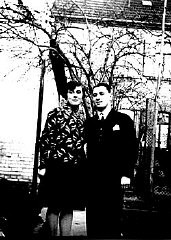<< Previous | Displaying results 11-20 of 2603 for "" | Next >>
-
Corpses in Dachau
PhotoA pile of corpses in the newly liberated Dachau concentration camp. Dachau, Germany, April 29-May 1945. This image is among the commonly reproduced and distributed, and often extremely graphic, images of liberation. These photographs provided powerful documentation of the crimes of the Nazi era.
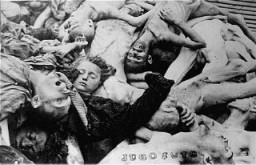
-
Bodies outside the crematorium at Dachau
PhotoThe bodies of former prisoners are piled outside the crematorium at the newly liberated Dachau concentration camp. Dachau, Germany, April–May 1945. This image is among the commonly reproduced and distributed, and often extremely graphic, images of liberation. These photographs provided powerful documentation of the crimes of the Nazi era.
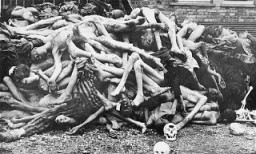
-
Beifeld album cover
PhotoCover to György Beifeld's album, featuring a road sign with the Hungarian Labor Service company number 109/13 posted in a muddy wasteland. The Jewish labor servicemen were forced to construct roads on these muddy fields to accommodate the advance of the Hungarian 2nd Army toward the Don River.
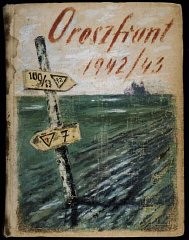
-
Beifeld album page
PhotoIn a take-off of travel posters advertising peaceful vacation spots, Beifeld draws a picture of a Hungarian military tent pitched next to a tree on which a bird is cheerfully chirping. Next to the tent the artist writes "Peaceful Surroundings" but above, a Soviet bomber releases a bomb aimed at the tent. [Photograph #58022]
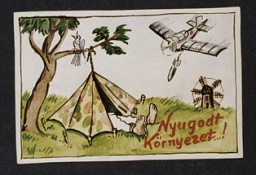
-
Doll belonging to Inge Auerbacher
PhotoIn 1942, seven-year-old Inge Auerbacher was deported with her parents to the Theresienstadt ghetto. She brought along this doll, named “Marlene” after German actress Marlene Dietrich, which her grandmother had given her. It would remain with Inge throughout her three years of imprisonment in the ghetto.
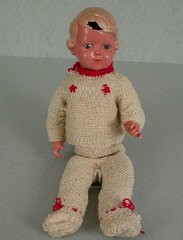
-
Frieda Greinegger and Julian Noga
PhotoA hand-tinted photograph of Frieda Greinegger and Julian Noga as a young couple. The two had met when Julian, a forced laborer from Poland, arrived at the Greinegger farm in northern Austria. In 1941, the Gestapo sent both to concentration camps after learning of their forbidden friendship. Place uncertain, after 1945.
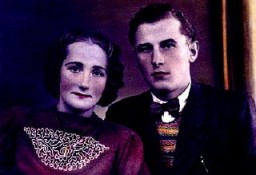
-
A family outing in happier times
PhotoFrieda Greinegger during a family outing to a park in the mid-1930s. Frieda would later spend almost two years in the Ravensbrück concentration camp as punishment for consorting with a Polish forced laborer, Julian Noga. Austria, ca. 1935.
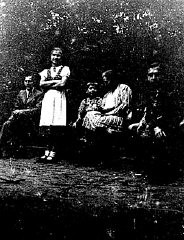
-
A portrait of the Greinegger family
PhotoThe Greinegger family, shown here in a formal portrait, were prosperous farmers in northern Austria. During World War II, the son died as a soldier in the German army. The second youngest daughter, Frieda, spent almost two years in Ravensbrück concentration camp for consorting with a Polish forced laborer, Julian Noga. Frieda and Julian married after the war. Place and date of photograph uncertain.
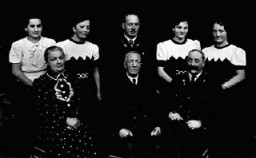
-
Two French partisans
PhotoTwo French partisans, Missak Manouchian (left) and Wolf Wajsbrot (right), who belonged to the French armed resistance group Francs-Tireurs et Partisans. They were executed by firing squad on February 21, 1944. Paris, France, February, 1944.
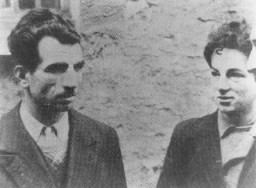
-
Fritz and Ida Lang, Jewish proprietors of a dry goods store in Germany
PhotoFritz and Ida Lang, Jewish proprietors of a dry goods store in Lambsheim, posed for this picture around 1934. In the early 1940s, Nazi authorities deported the Langs and their young daughter, Freya, to detention camps in France. Ida died after deportation to Auschwitz. Fritz survived and reunited with his daughter in 1946. Lambsheim, Germany, ca. 1934.
